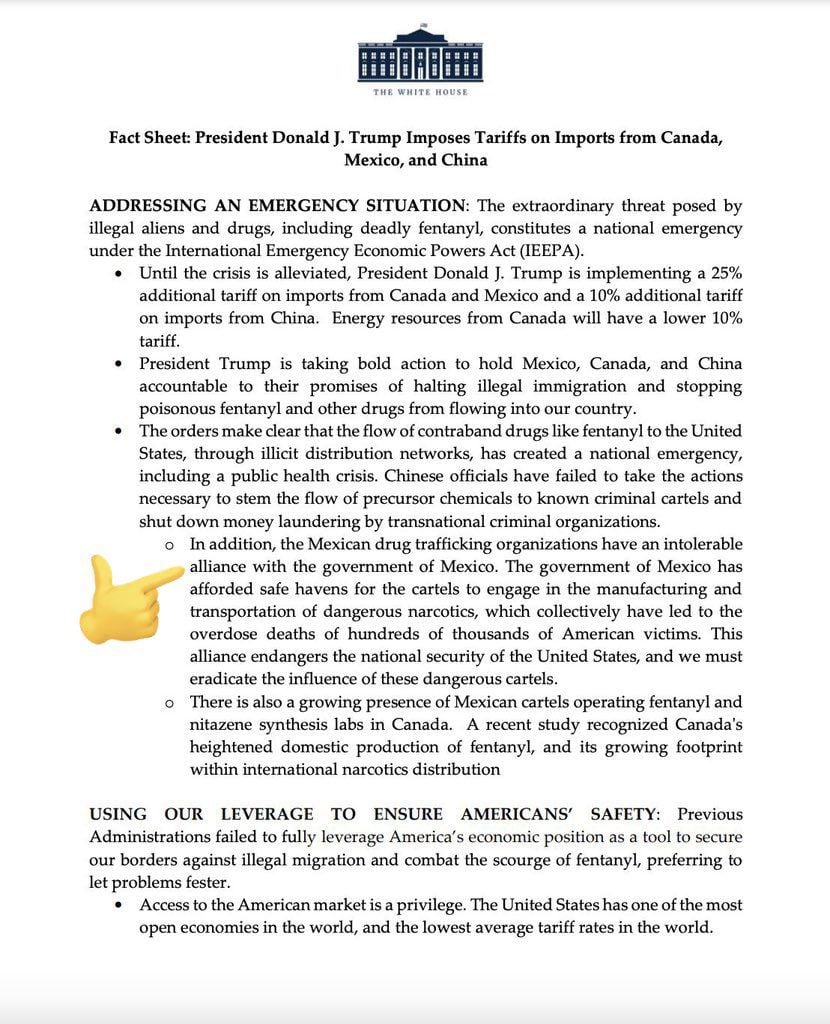ADVERTISEMENT
Tensions between the U.S. and its closest trading partners escalated yesterday as both Canada and Mexico vowed to implement retaliatory tariffs in response to President Donald Trump’s decision to impose sweeping tariffs on goods from the two countries, as well as China.
This move follows the signing of executive orders by Trump, which impose a 25% tariff on Mexican and Canadian imports, and a 10% tariff on goods from China, citing concerns over illegal immigration and the fentanyl crisis.
Canada Strikes Back with $155 Billion in Retaliatory Tariffs
Canadian Prime Minister Justin Trudeau was the first to detail his country’s response, announcing that Canada would impose a 25% tariff on $155 billion worth of U.S. goods, in retaliation for Trump’s new trade measures.
Trudeau revealed that $30 billion worth of goods would face immediate tariffs, set to take effect this Tuesday, the same day the U.S. tariffs are set to begin. The rest of the tariffs will be phased in over the next three weeks to give Canadian businesses and supply chains time to adjust. Trudeau emphasized the long-standing U.S.-Canada alliance, urging the U.S. to reconsider its stance and work with Canada rather than penalize it.
Trudeau warned that these tariffs would result in higher prices for everyday items in the U.S., and encouraged Canadians to support domestic goods and rethink travel plans to stay within Canada during the summer.
Mexico Follows Suit with «Plan B»
Not far behind, Mexican President Claudia Sheinbaum took to X to announce her government’s intentions to implement a comprehensive «Plan B», which will include both tariff and non-tariff measures in retaliation to Trump’s trade policies.
While Sheinbaum did not specify details about the measures, she made it clear that Mexico rejects the «slander» from the U.S. government regarding its alleged ties to criminal organizations, and strongly condemned any infringement on Mexico’s sovereignty.
Sheinbaum insisted that Mexico is committed to combating fentanyl and illegal immigration, but emphasized that the fight must be a collaborative effort, rooted in mutual trust and respect for sovereignty. «Coordination, yes; subordination, no,» she declared in her post.
The Broader Impact on U.S.-Canada-Mexico Relations
Both Canada and Mexico have long been integral to U.S. supply chains, with goods from these nations accounting for more than 40% of U.S. imports last year. A prolonged trade dispute could increase costs for U.S. consumers, particularly on products like food, electronics, and automobiles.
The U.S.-Canada-Mexico Agreement (USMCA), signed under the Trump administration in 2020, was expected to smooth over trade disputes, but this latest round of tariffs signals further breakdowns in cooperation between the three nations.
China’s Response: WTO Lawsuit and Countermeasures
China, which has been embroiled in a trade war with the U.S. under President Trump’s previous tariff measures, also condemned the tariffs and pledged to file a lawsuit with the World Trade Organization (WTO). China stated that it would take necessary countermeasures to protect its trade interests and urged the U.S. to work towards mutual understanding and dialogue rather than escalating the situation.
China’s Ministry of Commerce expressed concern that additional tariffs would undermine ongoing counter-narcotics cooperation and impact diplomatic relations. This will likely complicate efforts to combat global issues like fentanyl trafficking, a major point of contention between the two countries.
The U.S. Tariff Strategy: Aimed at Fighting Fentanyl and Immigration
In his statement, Trump justified the tariffs as a necessary step to combat illegal immigration and the fentanyl crisis, both of which he has repeatedly blamed on Mexico and China. He claimed that the new measures would address these issues by pressuring these countries to cooperate more effectively with the U.S. to curb the flow of illegal drugs and migrants into the country.
The majority of fentanyl seizures along the U.S. southern border have been linked to Mexico, not Canada, according to U.S. Customs and Border Protection data.
Economic Fallout and Global Consequences
The immediate fallout of these retaliatory tariffs could be felt across the North American continent.
The tariffs on Canadian and Mexican goods could particularly hurt the automobile industry, agriculture, and energy sectors in the U.S. and Canada, while China’s retaliation could impact U.S. tech firms and manufacturers who rely on Chinese imports.
About The Author
Read the full article here
